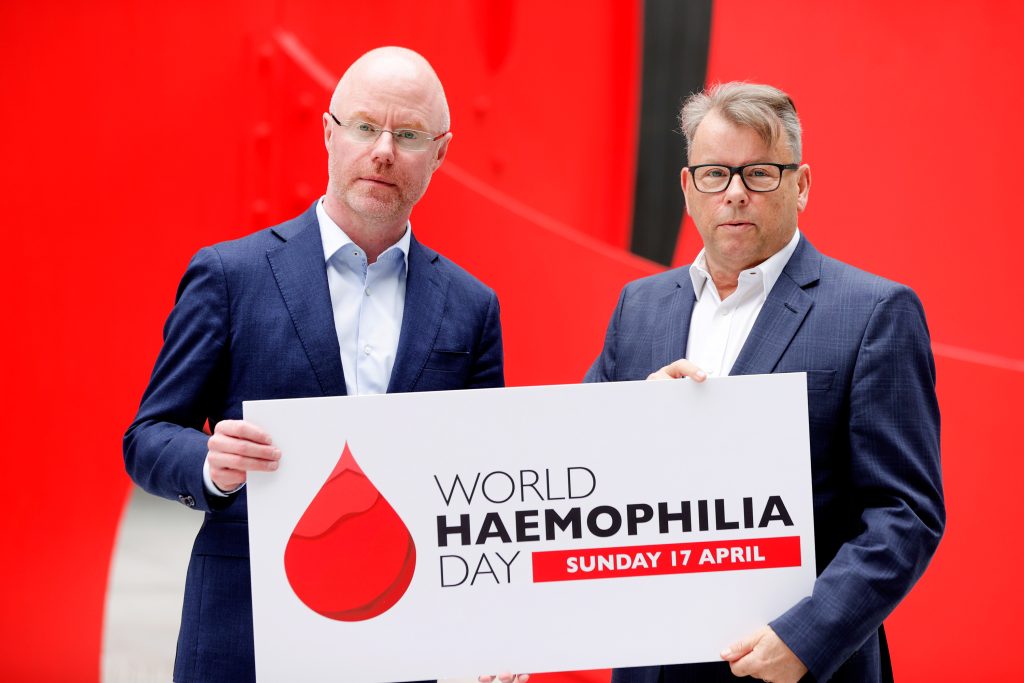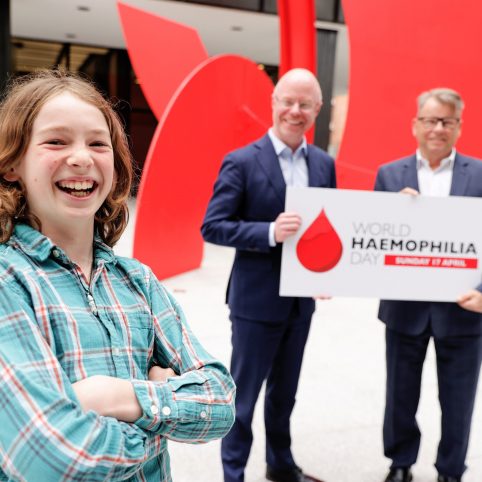20 years on from the publication of the Lindsay Tribunal Report, procurement of Haemophilia medications in Ireland overseen by the Haemophilia Product Selection and Monitoring Advisory Board (HPSMAB) is now seen as the most effective model globally in haemophilia care. The success of the HPSMAB and National Haemophilia Council (NHC) is being highlighted by the Irish Haemophilia Society ahead of World Haemophilia Week which begins this Sunday, 17th April.
The Lindsay Tribunal of Inquiry into the infection of people living with Haemophilia with HIV and/or Hepatitis C, found that because of contaminated blood products supplied by the state, a total of 106 people with Haemophilia were infected with HIV and 255 people were infected with Hepatitis C. To date, 114 of these people have died.
As a result of the findings of the report, two separate bodies were established in Ireland: The National Haemophilia Council, a statutory body established to advise the Minister for Health and HSE on aspects of treatment and care; and the HPSMAB, a non-statutory board to provide expertise and advice on the procurement of the safest and most effective treatments for Haemophilia.
Haemophilia is a group of inherited blood disorders in which there is a life-long defect in the clotting mechanism of the blood. It is a genetic blood disorder, which is usually inherited, and a rare disease with around 400,000 people living with the condition globally and 900 here in Ireland. The gene is passed down from a parent to a child. With no known cure, a person who is born with Haemophilia must learn to live with the condition with the aid of various treatments.
Speaking at the launch of World Haemophilia Awareness Week, Minister for Health,World Haemophilia Day, T.D. said: “Since the publication of the Lindsay Tribunal Report 20 years ago, Ireland has come a long way to ensure quality treatment options for patients. Today, we remember all those Haemophilia patients who were impacted and their families. Awareness days such as this, help us to raise further awareness and educate people about this rare disease. I would like to commend the work of the Irish Haemophilia Society, The National Haemophilia Council, the HPSMAB and the haemophilia treatment centres for their continuous hard work and dedication in providing quality care for those living with Haemophilia to improve quality of life for all affected.”
Ireland is leading the way in the treatment of Haemophilia

of World Haemophilia Day this Sunday 17th April
As a result of the Lindsay Tribunal Report and subsequent founding bodies, Ireland has been at the forefront in terms of the introduction of the latest and most effective therapies. The HPSMAB has saved Ireland enormous costs in the supply of quality treatment for those living with Haemophilia and Ireland now has the most effective model of the procurement of Haemophilia medications globally. In 2002, Ireland was paying 26% above the EU average price for Haemophilia products. Now, Ireland is paying significantly below the EU average price.
Director of the National Coagulation Centre, Prof. Niamh O Connell, said: “The significant achievements seen in the organisation of Haemophilia care in Ireland have been built on a model of strong collaboration and partnership between the Haemophilia treaters, the treatment centres at St. James’s Hospital, Children’s Health Ireland at Crumlin Hospital in Dublin, University Hospitals in Cork and Galway and the Irish Haemophilia Society, with key input and engagement from the Department of Health.”
Brian O’ Mahony, Chief Executive of the Irish Haemophilia Society and Haemophilia B patient, commented “World Haemophilia Day enables us to raise much needed awareness of Haemophilia to ensure patients have access to the care they need, when they need it. The Irish Haemophilia Society has provided training on procurement to doctors, patient organisations and health officials in over 30 countries since 2010. Unfortunately, we cannot change the past, but we are working hard together with the Minister for Health, The National Haemophilia Council and HPSMAB to ensure Haemophilia patients in Ireland have access to world-class treatments. We are also actively engaging with other countries to ensure their patients too, can have appropriate treatment options for patients living with Haemophilia. It’s our belief that a similar system of organisation and formal involvement of doctors and the relevant patient organisations in the care and procurement of medications could benefit many other rare or indeed chronic diseases in Ireland.”
Also speaking today, John Stack, Father of both Fionn and Oisin living with Haemophilia A, said, “World Haemophilia Day is important, and it gives the public an insight into what life is like for my two boys, Fionn and Oisin, who are age 9 and 11 respectively. Fionn and Oisin were both diagnosed with Haemophilia A at a young age but due to the advancements in treatments, they are luckily leading an active and normal childhood. 20 years ago, their outcomes may have been somewhat different. I am so grateful to the Irish Haemophilia Society. Because of them, parents like myself, have somewhere to turn to for education, support and advice on how best to navigate life with Haemophilia for my children.”
For further information on Haemophilia, please visit the Irish Haemophilia Society’s website at: www.haemophilia.ie
